Mazda 2 Hybrid VS Toyota Yaris
In the competitive subcompact segment, the Mazda 2 Hybrid stands out with its stylish design and engaging driving dynamics, appealing to those who prioritize both aesthetics and performance. Conversely, the Toyota Yaris offers proven reliability and exceptional fuel efficiency, making it a top choice for practical-minded consumers. Ultimately, the choice between these two models hinges on whether buyers favor spirited handling or dependable everyday usability.
Mazda 2 Hybrid
The Mazda 2 Hybrid impresses with its sleek design and advanced hybrid technology, making it a strong contender in the compact car category. It offers a refined driving experience with smooth transitions between electric and petrol power, ensuring both efficiency and performance. Inside, the cabin is thoughtfully designed, providing comfort and intuitive controls for a modern driving experience.
detailsToyota Yaris
The Toyota Yaris exudes a charming blend of practicality and style, making it an appealing choice for urban drivers. Its compact design allows for easy manoeuvrability in crowded city streets, while the interior offers a surprisingly spacious and comfortable environment. With a focus on fuel efficiency and reliability, the Yaris remains a popular option for those seeking a balance between performance and economy.
detailsIntroduction to the Compact Segment
In the crowded compact car segment, the battle between the Mazda 2 Hybrid and the Toyota Yaris continues to heat up. Both models are efficient, versatile, and packed with the latest innovations, but they have distinct characteristics that cater to different types of drivers. In this comparison, we’ll explore the technical aspects, innovations, and overall performance of these two hatchbacks to help you make an informed decision.
Powertrains and Performance
The Mazda 2 Hybrid features a full hybrid engine that produces 116 HP from a 1.5-litre three-cylinder powerplant. It comes standard with a continuously variable transmission (CVT) and operates through a front-wheel-drive system, providing a smooth and responsive driving experience. With a 0-100 km/h acceleration time of 9.7 seconds and a maximum speed of 175 km/h, the Mazda 2 Hybrid demonstrates agility suitable for urban driving.
On the other hand, the Toyota Yaris offers a more flexible powertrain lineup. It not only features a full hybrid engine like the Mazda but also includes a petrol variant. The Yaris’ hybrid variant matches the Mazda’s output at 116 HP, while the petrol models can go up to 130 HP. Toyota's Yaris shows a slight edge in acceleration, clocking in at 9.2 seconds for its hybrid model. Additionally, its top speed is compatible with Mazda, maxing out at 175 km/h. Furthermore, the Yaris offers both manual and automatic transmission options, giving drivers more choices to suit their preferences.
Fuel Efficiency and Emissions
When it comes to fuel efficiency, both cars perform admirably. The Mazda 2 Hybrid boasts an impressive fuel consumption of just 3.8 L/100 km, making it one of the most economical options in its class. With CO2 emissions as low as 87 g/km, it achieves a solid efficiency rating classified as ‘B’. Whether you're commuting or running errands, the Mazda 2 aims to keep your fuel expenses minimal.
The Toyota Yaris is similarly efficient, with its hybrid variant also achieving a consumption rate of 3.8 L/100 km. However, its petrol engines can consume up to 9.5 L/100 km depending on the configuration, highlighting the versatility of its offerings. The Yaris still maintains a competitive emissions footprint, with CO2 figures starting at 87 g/km for its hybrids. The different fuel options make it appealing for a broader audience.
Interior and Practicality
Stepping inside the Mazda 2 Hybrid, occupants will find a well-designed cabin that comfortably seats five. The interior is characterized by quality materials and an intuitive layout that emphasizes driver engagement. The trunk capacity stands at 286 liters, providing ample space for daily usage without sacrificing a sleek exterior.
The Toyota Yaris, while also seating five, offers some variations in layout for different trims. The Yaris features a slightly larger trunk capacity for lower trims, measuring up to 141 liters. Additionally, the design leans towards a more spacious feel, particularly in higher-end models. With practical storage solutions throughout the cabin, the Yaris caters well to active lifestyles.
Safety Features and Innovations
Safety is paramount in both models, and each car is equipped with advanced driver-assistance systems. The Mazda 2 Hybrid incorporates several safety features such as emergency braking, lane departure warning, and adaptive cruise control. These technologies reflect Mazda's commitment to ensuring peace of mind for drivers and passengers alike.
The Toyota Yaris takes safety a step further by including its Toyota Safety Sense suite, which adds features like pre-collision systems, intelligent parking assist, and adaptive headlights. This robust safety framework has earned the Yaris high ratings in crash tests, highlighting Toyota's reputation for reliability.
Conclusion: Choosing the Right Compact Hybrid
Ultimately, both the Mazda 2 Hybrid and the Toyota Yaris offer compelling choices in the compact car segment. The Mazda impresses with its fuel efficiency, driving dynamics, and stylish design, while the Yaris shines with its versatility, additional powertrain options, and advanced safety features. Prospective buyers should consider their individual needs and preferences, whether that leans toward a sporty drive or greater flexibility. In any case, both models are fantastic representatives of modern hybrid engineering and design.
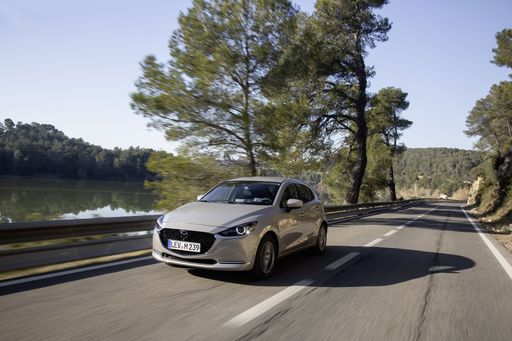 @ de.mazda-press.com
@ de.mazda-press.com
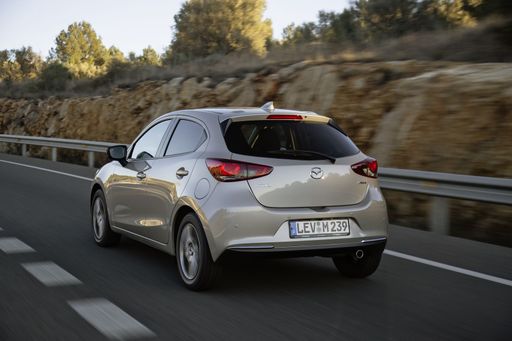 @ de.mazda-press.com
@ de.mazda-press.com
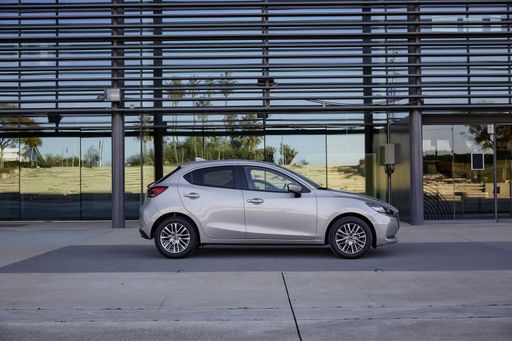 @ de.mazda-press.com
@ de.mazda-press.com
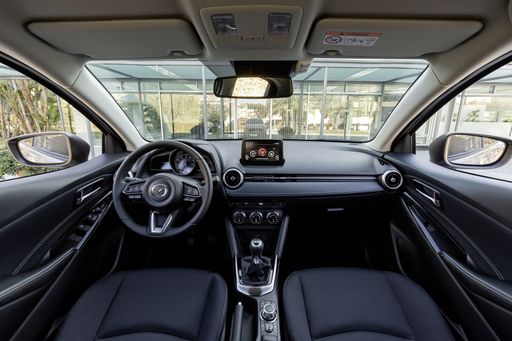 @ de.mazda-press.com
@ de.mazda-press.com
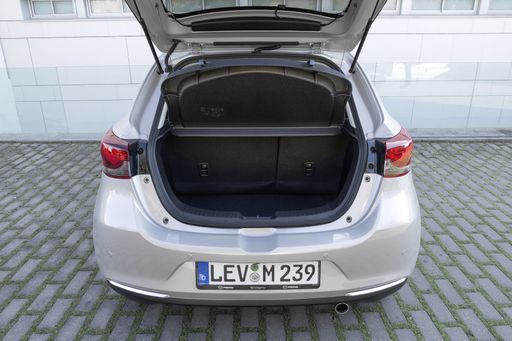 @ de.mazda-press.com
@ de.mazda-press.com
 @ Toyota
@ Toyota
 @ Toyota
@ Toyota

|

|
|
|
|
Costs and Consumption |
|
|---|---|
|
Price
about 23100 - 30400
$
|
Price
about 23600 - 46200
$
|
|
Consumption L/100km
3.8 - 4
L
|
Consumption L/100km
3.8 - 9.5
L
|
|
Consumption kWh/100km
-
|
Consumption kWh/100km
-
|
|
Electric Range
-
|
Electric Range
-
|
|
Battery Capacity
-
|
Battery Capacity
-
|
|
co2
87 - 93
g/km
|
co2
87 - 215
g/km
|
|
Fuel tank capacity
36
L
|
Fuel tank capacity
36 - 50
L
|
Dimensions and Body |
|
|
Body Type
Hatchback
|
Body Type
Hatchback
|
|
Seats
5
|
Seats
4 - 5
|
|
Doors
5
|
Doors
3 - 5
|
|
Curb weight
1180
kg
|
Curb weight
1090 - 1356
kg
|
|
Trunk capacity
286
L
|
Trunk capacity
141 - 286
L
|
|
Length
3940
mm
|
Length
3940 - 3995
mm
|
|
Width
1745
mm
|
Width
1745 - 1805
mm
|
|
Height
1505
mm
|
Height
1455 - 1500
mm
|
|
Payload
435
kg
|
Payload
289 - 525
kg
|
Engine and Performance |
|
|
Engine Type
Full Hybrid
|
Engine Type
Full Hybrid, Petrol
|
|
Transmission
Automatic
|
Transmission
Automatic, Manuel
|
|
Transmission Detail
CVT
|
Transmission Detail
CVT, Manual Gearbox, Automatic Gearbox
|
|
Drive Type
Front-Wheel Drive
|
Drive Type
Front-Wheel Drive, All-Wheel Drive
|
|
Power HP
116
HP
|
Power HP
116 - 280
HP
|
|
Acceleration 0-100km/h
9.7
s
|
Acceleration 0-100km/h
5.5 - 9.7
s
|
|
Max Speed
175
km/h
|
Max Speed
175 - 230
km/h
|
|
Torque
-
|
Torque
390
Nm
|
|
Number of Cylinders
3
|
Number of Cylinders
3
|
|
Power kW
85
kW
|
Power kW
85 - 206
kW
|
|
Engine capacity
1490
cm3
|
Engine capacity
1490 - 1618
cm3
|
|
Top speed
175
km/h
|
Top speed
175 - 230
km/h
|
General |
|
|
Model Year
2024
|
Model Year
2024
|
|
CO2 Efficiency Class
B
|
CO2 Efficiency Class
B, G
|
|
Brand
Mazda
|
Brand
Toyota
|
Mazda 2 Hybrid
The All-New Mazda 2 Hybrid: A Leap into the Future of Urban Driving
The 2024 Mazda 2 Hybrid is a testament to Mazda’s commitment to blending innovation and efficiency in a compact package, perfect for urban driving. This hybrid marvel harmoniously balances performance, style, and cutting-edge technology.
Engineered Excellence: Power and Performance
Under the bonnet, the Mazda 2 Hybrid is powered by a full-hybrid system. This sophisticated mechanism combines a combustion engine with electric power, generating a robust 116 PS (or 85 kW). With a responsive acceleration of 0-100 km/h in just 9.7 seconds, this car ensures a dynamic driving experience without compromising fuel efficiency.
Efficiency and Environmental Responsibility
The Mazda 2 Hybrid shines in fuel economy with a noteworthy consumption range of 3.8 to 4 L/100 km. Not only does it offer outstanding efficiency for budget-conscious drivers, but it also projects a responsible attitude towards the environment. With CO2 emissions ranging from 87 to 93 g/km, it holds a respectable B efficiency rating, making it an attractive option for eco-friendly car enthusiasts.
Design and Dimensions: The Compact Urban Companion
With its hatchback design, the Mazda 2 Hybrid embraces both style and practicality. Its compact dimensions—3940 mm in length, 1745 mm in width, and 1505 mm in height—make it ideal for navigating through tight city streets. Despite its size, the Mazda 2 Hybrid offers a comfortable and spacious interior for up to five passengers, complemented by a generous boot capacity of 286 litres.
Technology and Comfort: Innovative Features
The Mazda 2 Hybrid is equipped with a CVT (Continuously Variable Transmission) that offers a seamless driving experience. Advanced features like state-of-the-art infotainment systems and connectivity options ensure both driver and passengers enjoy a connected journey. The model is available in several trim levels, including Centre-Line CVT, Exclusive-Line CVT, Homura CVT, Homura Plus CVT, and Prime-Line CVT, each offering unique features to tailor to various preferences.
Safety and Assurance
In addition to comfort and performance, the Mazda 2 Hybrid prioritises safety. Its robust structure and advanced safety systems deliver peace of mind while traversing urban landscapes. Mazda’s focus on safety innovation ensures each journey is as secure as it is enjoyable.
A Smart Investment: Pricing and Running Costs
With a starting price ranging from €24,990 to €32,890, the Mazda 2 Hybrid positions itself as an attractive choice for those seeking cutting-edge hybrid technology without breaking the bank. Its running costs, including a monthly expenditure between €723 and €855 and a cost per kilometre ranging from 28.9 to 34.2 cents, underscore its economic benefit over time.
Conclusion: The New Benchmark for Urban Hybrids
The Mazda 2 Hybrid represents a harmonious amalgamation of efficiency, innovation, and practicality, tailored for the modern urbanite. As cities continue to evolve, the need for sustainable and versatile transport solutions becomes paramount, and the Mazda 2 Hybrid meets these needs with aplomb, setting a new benchmark for hybrids in its class.
Toyota Yaris
Introducing the Next-Gen Toyota Yaris: A Blend of Innovation and Technology
The Toyota Yaris has long been lauded for its efficiency, reliability, and practicality. As we venture into the 2024 model year, Toyota has upped the ante with the latest versions of this popular hatchback, melding cutting-edge technology with eco-conscious design. Here’s an in-depth look at what makes the current Yaris line-up stand out from the crowd.
Efficient Powertrains: Hybrid and Beyond
Spearheading the technological innovation in the Yaris range is the introduction of various hybrid models. The Yaris offers a 1.5-litre full-hybrid engine, marrying a petrol engine with an electric motor to produce between 116 and 130 PS. This power blend is controlled via a sophisticated CVT-gearbox, optimizing both performance and fuel efficiency, with consumption figures ranging from an impressive 3.8 to 4.2 litres per 100 km.
For those seeking pure performance, the GR Yaris variants provide a turbocharged 1.6-litre engine capable of producing 280 PS. This power is delivered via a choice of manual or automatic transmission, giving drivers the tactile involvement or convenience they desire.
Design that Fulfils and Inspires
The Yaris hasn't forgotten its roots as a compact, city-friendly hatchback, measuring between 3,940 and 3,995 mm in length. With its bold front grille, sleek lines, and a choice of striking colours, it's a car that turns heads while remaining perfectly suited for urban environments.
The interior is equally impressive, designed with a focus on driver convenience and comfort. Depending on the variant, Yaris can offer generous cargo space of up to 286 litres, making it a perfect companion for everyday tasks or weekend escapes.
Technological Integration: The Smart Choice
Toyota's approach goes beyond just improving engine technology; the Yaris is packed with innovative features aimed at enhancing the driving experience. It boasts a suite of advanced safety systems such as lane departure alert, pre-collision system, and adaptive cruise control, ensuring peace of mind on the road.
The infotainment system in the Yaris is designed to keep you connected, offering seamless smartphone integration, a user-friendly interface, and an intuitive navigation system, ensuring that you're always informed and entertained.
The Cost of Innovation
Owning a Yaris is not just about impressive technology; it's also about making economic sense. With a price range between €25,500 and €49,990, and monthly costs spanning from €748 to €1,513, it offers a broad spectrum to suit different budget needs.
Concerned about emissions? You can rest easy knowing that the Yaris boasts a CO2 efficiency class ranging from B to G, thanks to its low emissions output of between 87 to 215 g/km.
Conclusion: The Toyota Yaris Drives the Future
The Toyota Yaris continues to be a strong contender in the compact car segment, pushing boundaries with its innovative full-hybrid systems and performance-oriented GR models. It's a remarkable blend of design, technology, and economy, ensuring it remains a top choice for drivers who demand more from their hatchbacks.
Whether you're seeking the efficiency of a hybrid or the thrill of the GR Yaris, there's a model tailored to your unique driving needs in Toyota's latest Yaris lineup.
